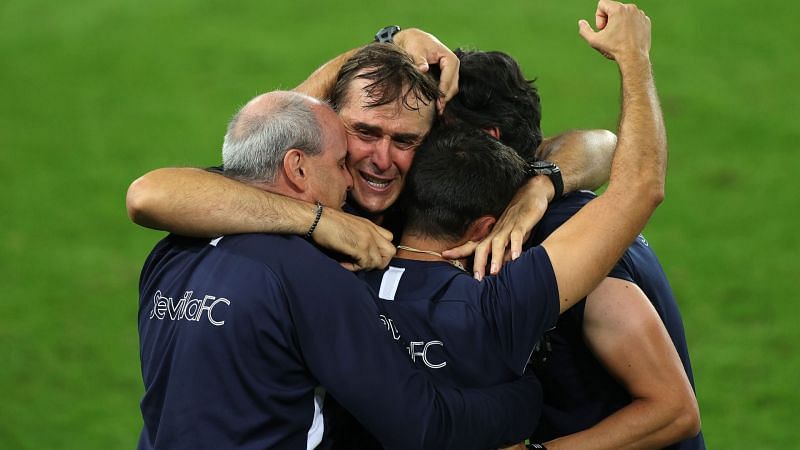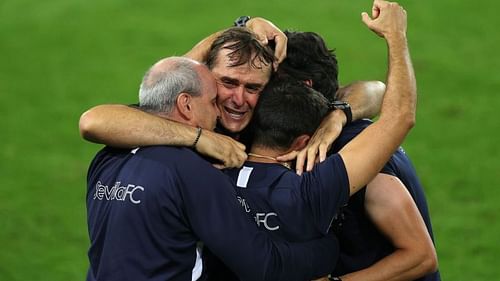
Lopetegui gets his redemption as fortune smiles on Sevilla, Europa League champions again

Luuk de Jong's unlikely heroics, Diego Carlos controversially escaping a red card, Romelu Lukaku losing focus at the decisive moments – much will be analysed and discussed in excruciating detail following Sevilla's latest Europa League success, but Julen Lopetegui deserves all of the attention.
This is a tale of redemption, from a man who was lambasted and derided in equal measure over the past two-and-a-bit years, to a coach who masterminded a European success against a sleeping giant that was ready to awaken.
Lopetegui's history is well-known – on the eve of the 2018 World Cup, he was unceremoniously given the boot by Spain for agreeing to join Real Madrid, for whom he had previously worked in the youth team, after the tournament.
It was an ugly affair that, rightly or wrongly, led to Lopetegui harbouring the blame for Spain's disappointing campaign, for which Fernando Hierro ultimately took charge.
Lopetegui's Real Madrid dream then lasted only until October, his sacking coming after a humiliating 5-1 Clasico defeat to Barcelona.
The Basque coach, a former goalkeeper for both Clasico clubs, disappeared from the limelight, and who could blame him?
That was until Monchi came calling in June 2019.
Jesús Navas = Sevilla legend!
— UEFA Europa League (@EuropaLeague) August 21, 2020
#UELfinal pic.twitter.com/qvPv17QQ4S
Sevilla's sporting director will rightly receive acclaim from far and wide for this triumph – after returning from an underwhelming spell with Roma last year, he built a squad that has got the club back into the Champions League via a fourth-placed LaLiga finish, and now possesses yet another Europa League crown.
But Lopetegui is the true hero of this success. To further understand Lopetegui's fight, we must go back to February.
Sevilla scraped past Cluj in the Europa League last 32. A 1-1 draw in Romania was followed by the cagiest of return legs, as Los Nervionenses were dominated for long stretches.
Their European quest appeared to be over when Cluj scored late on… But VAR bailed them out.
Real discontent from the fans swirled around the team and Lopetegui at that point – they haven't lost a game since, embarking on a club-record 20-match unbeaten run.
Aside from some of their players attracting negative headlines due to their lack of social distancing, the coronavirus-enforced hiatus served Sevilla well.
After securing fourth in LaLiga, they came into the Europa League knowing they were likely to face an extremely difficult route to winning the tournament – Roma came first, then Wolves, Manchester United and now Inter. They all failed to end the club's remarkable record in European finals.
But there's no doubt they rode their luck in Cologne on Friday.
Sevilla #UEL pic.twitter.com/GzyhI12Ilr
— UEFA Europa League (@EuropaLeague) August 21, 2020
It looked like being a long night for Sevilla right from the off – a rare lapse from Ever Banega on the edge of the Inter box allowed the Italians to break, and pantomime villain Diego Carlos then took centre-stage.
The highly rated Brazilian, who conceded penalties against both Wolves and Manchester United, continued his bizarre streak as he found himself the wrong side of Romelu Lukaku, who he eventually hauled down in the area.
Quite how Diego Carlos remained on the pitch is a mystery. He clearly made no attempt to get the ball, but referee Danny Makkelie only produced a yellow. It would prove decisive, but initially Lukaku made the most of the spot-kick and at that point one had to fear for Sevilla.
A resilience swiftly shone through, however. Luuk de Jong, one of the most heavily criticised players in Spain this season, again showed his worth as he did with the winner in the semi-final.
A clever stooping header from Jesus' Navas' cross gave Samir Handanovic too much to do, and he soon followed that up with an even better goal – again with his head – as he met a marvellous delivery from the exceptional Banega.
Given he had previously lost his place in the team to Youssef En-Nesyri, being restored to the line-up was a big call by Lopetegui, but the Dutchman – scorer of just eight goals before this game – vindicated the decision.
Diego Carlos was again under the microscope for the equaliser. His needless foul led to Marcelo Brozovic's free-kick, and Diego Godin lost the former Nantes defender to nod home.
The second half was a much tenser occasion – Sevilla continued to see more of the ball, but Inter appeared to have the greater threat in attack.
Lukaku failed to beat Yassine Bounou when one-one-one and Sevilla took full advantage.
Inter failed to clear a corner and Diego Carlos unleashed an overhead-kick, which Lukaku turned into his own net with 16 minutes to go.
And that was that.
Inter's chance to end a nine-year wait for silverware ended with that incident, as Sevilla clinched the trophy, remarkably, for a sixth time in just over 14 years.
As was the case all of those years ago when they won their first against Middlesbrough, much of the spotlight will fall on Monchi, the transfer guru, but Lopetegui fought back from the brink to mastermind this triumph.
From moulding together what was essentially a brand new squad, to establishing a new style of play that secured Champions League football and another European success for Sevilla, Lopetegui answered his critics resoundingly.
This was a tale of redemption.
¡FINAL EN COLONIA!
— Sevilla Fútbol Club (@SevillaFC) August 21, 2020
𝗨𝗡𝗔
𝗗𝗢𝗦
𝗧𝗥𝗘𝗦
𝗖𝗨𝗔𝗧𝗥𝗢
𝗖𝗜𝗡𝗖𝗢
𝗬 𝗔𝗛𝗢𝗥𝗔...
¡¡¡!!!
¡SOMOS 𝗛𝗘𝗫𝗔𝗖𝗔𝗠𝗣𝗘𝗢𝗡𝗘𝗦 DE EUROPA!
@LuukdeJong9 (2) - Diego Carlos
#WeareSevilla #SomosVosotros #UELFinal pic.twitter.com/yjLxtalQIp